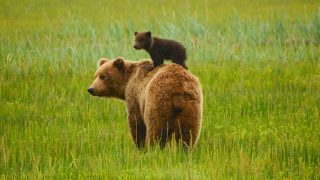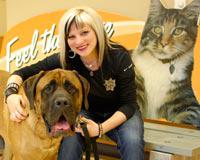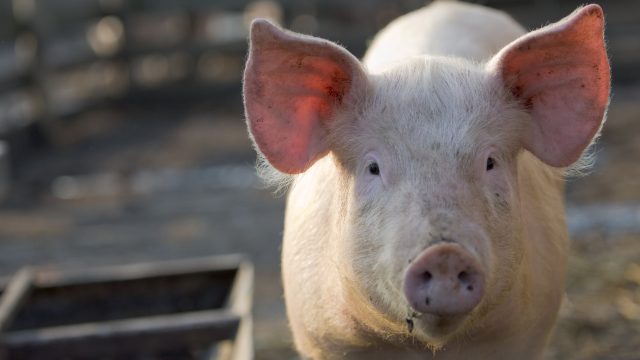
Where Are They Now? Emily Davidsohn

Among ALDF’s many efforts to support the field of animal law is our growing network of Student Animal Legal Defense Fund (SALDF) chapters on law school campuses throughout the U.S. and Canada. SALDF chapters provide a forum for education, advocacy, and scholarship, aiming to protect the lives and advance the interests of animals through the legal system. In this continuing series of updates on former SALDF members, ALDF is proud to spotlight Emily Davidsohn.
It’s not hard to see why Emily Davidsohn has already managed to land her dream job. While co-chairing the SALDF chapter at Vermont Law School, Emily (class of 2009) had a knack for transforming even modest ideas into big events, such as their annual vegan Thanksgiving, a free feast for 100 students. “We never had the dinner catered,” she says. “SALDF members prepared the entire meal, and it became a forum for discussion between a diverse group of individuals about the legal and ethical issues surrounding animals raised for food.”
Emily is now the investigations staff attorney and case coordinator at the Oregon Humane Society (OHS) in Portland—a job she lobbied hard to get, approaching her goal from two directions. “First, I started volunteering at OHS as a dog walker,” she explains. “I was willing to work my way up from a volunteer dog walker to an employee in the Investigations Department no matter how long it took. I thought that walking dogs would be a way to meet the right people and spread the word that I was interested in the department and also had a legal background.” Next, she wrote a letter to one of the officers in her department, explaining her background in animal law and her connection with Scott Heiser, director of ALDF’s Criminal Justice Program, who had been mentoring her since her second year in law school, when she worked in his Portland office as an intern. “In my letter I offered to do a semester-long internship for free in the Investigations Department. After volunteering in the department for about five months, my supervisor decided that they needed to create a position for me within the department.”
As a liaison between her department and the district attorneys who prosecute OHS’s cases, Emily’s job covers a wide range of responsibilities. “No two days are alike,” she says. “I review the case packets—crime reports, vet reports, photos, etc.—before they are submitted to the DAs and am a contact for them if problems arise with our submissions. I review search warrants before they are submitted to the DAs for review. I calculate our restitution in cases and advise the officers on Fourth Amendment issues and any other legal concerns that arise. I conduct foreclosure sales on animals that we have seized. I assist with forfeiture proceedings when necessary to gain possession of an animal. I supervise our law internship program. I help write policy for the department and conduct trainings with other law enforcement agencies. I monitor the status of our cases as they proceed through the justice system and attend any of our cases that go to trial, and I assist on large seizures with evidence collection and documentation.”
In addition to Scott Heiser, Emily singles out Linda Fielder, OHS investigations manager, as an important mentor. “Working with Linda has taught me about coordinating animal rescues, from 500 head of neglected cattle to a dying cat tied to a shopping cart and abandoned,” she says. “Her wealth of knowledge on veterinary medicine and animal behavior make every day a learning experience for me. There is a human aspect to certain animal crimes—hoarding, for example—and Linda has taught me how to acknowledge that aspect of a case while still promoting the welfare of the animals.”
Reflecting on her SALDF days, Emily says that, like most law school student groups, they were never awarded their full budget request for the events they wanted to sponsor throughout the year. “If we did not have the funds to host a SALDF event, we turned to ALDF for assistance. The generosity of ALDF enabled us to make a bigger impact on our law school population on a wider range of issues than we would have been able to otherwise. ALDF also provided assistance when members of our chapter wanted to attend the annual animal law conference in Portland, Oregon. With the help of ALDF, several SALDF members were always able to make the trip from Vermont to Oregon, where we were motivated by the knowledge we gained and the connections we made.”
An avid dog lover, Emily fondly recalls organizing her favorite event during her SALDF tenure: Furry Family Day. “This was an annual picnic on campus in the spring that brought together students and faculty and their companion animals. We had booths about laws that impacted domestic animals and raised money for a local dog rescue. In the week building up to the event, we featured a different dog available for adoption through the local rescue. A picture and a biography of the dog was sent out in an email each day to the entire law school, and the school bookstore hosted the dog for interested adopters to meet. This event highlighted the minimum-care requirements for companion animals in the state of Vermont and brought to light the realities of domestic animal overpopulation.”
Today, Emily and her husband, Ethan, share their home with three rescued animals: Ramona the Great Dane, Dually the mastiff, and Esio Trot the tortoise.
In offering advice to others who want to pursue a career in animal law, Emily takes a page directly from her own playbook. “Find a way to show people your talent and dedication. Show organizations that they need you, that you fill a gap they didn’t even realize they had. Try to make as many contacts as you can in the ‘industry.’ Attend conferences and trainings, and get to know the key players, who will think of your name when they are launching a new program.” It certainly worked for her.
How We Work
Recent News
-
Court Rules Texas Food Label Censorship Law is Unconstitutional
The law imposed unclear and vague standards on plant-based meat producers that violate the First AmendmentJanuary 29, 2026 Press Release -
Defend the Big Cat Public Safety Act
Urge your federal representative to oppose H.R. 7159, which aims to undo protections established by the Big Cat Public Safety Act, including by creating exemptions allowing direct contact with big cats, such as cruel cub petting. -
State Animal Protection Laws Ranked: Oregon is #1, North Dakota #50
20th edition of ALDF state and territory ranking report highlights major advancements & trends in animal protection across the U.S.January 27, 2026 News



